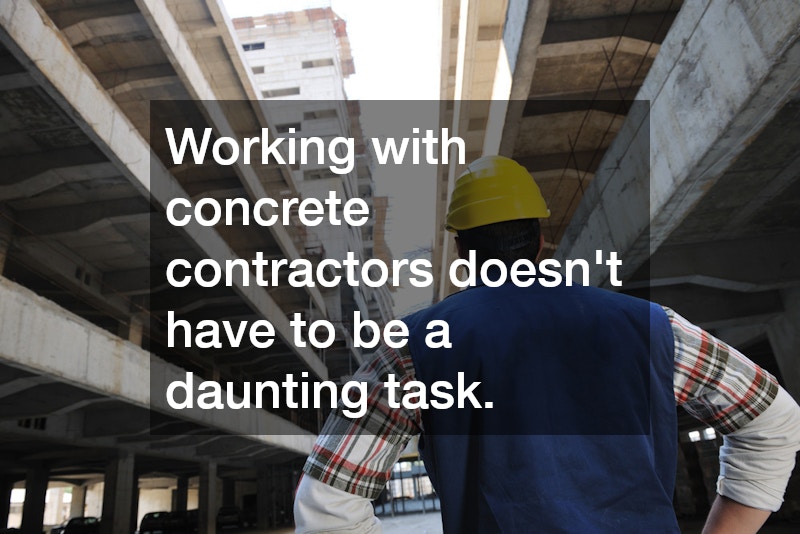
What Homeowners Should Know About Working with Concrete Contractors
Concrete projects can be a significant investment for any homeowner. Whether you are considering a new driveway, patio, or any other concrete work, understanding how to effectively work with concrete contractors is crucial. This article will help you navigate common concerns and questions about working with these professionals.
How to Choose the Right Concrete Contractor
Research and Recommendations
When selecting a concrete contractor, the first step is thorough research. Start by asking friends, family, and neighbors for recommendations, particularly those who have completed similar projects.
Personal referrals are invaluable as they offer insights into the contractor’s work ethic, customer service, and workmanship quality.
Online reviews also play a crucial role in your decision-making process. Websites like Yelp and Angie’s List provide extensive feedback from previous customers, giving you a broader idea of the contractor’s reputation in the community. Look for patterns in these reviews to understand common strengths or weaknesses.
Finally, do not overlook the power of social media and local forums. Platforms like Facebook local groups can connect you to firsthand accounts of positive or negative experiences with contractors. By compiling this information, you can form a well-rounded view of the contractors you’re considering.
Licensing and Insurance
Ensuring your contractor is licensed and insured is paramount for protecting yourself legally and financially. Licensed contractors have proven their knowledge and competence by meeting state or local requirements. This often includes passing exams and demonstrating past experience, which can assure homeowners of a baseline standard of quality and professionalism.
Insurance, on the other hand, safeguards you against any liabilities that may arise during the project. For instance, if a worker gets injured on your property or if there’s accidental damage, the contractor’s insurance should cover these incidents. Without proper insurance, you might find yourself facing unexpected legal and financial burdens.
To verify credentials, ask potential contractors for copies of their license and insurance certificates. You can also verify their status through the licensing board’s website or your local consumer protection agency. This diligence ensures you’re dealing with legitimate professionals.
Quotes and Estimates
Receiving multiple quotes is crucial when evaluating potential contractors. It gives you a comparative perspective on pricing and helps you understand the market rate for your specific project. When reviewing these quotes, consider not just the total cost but also what each contractor is offering in terms of materials, timeframe, and scope of work.
It’s vital to ensure that your potential contractor provides detailed estimates. A comprehensive estimate should include a breakdown of costs, projected timelines, and the quality and type of materials to be used. Any ambiguity here can lead to misunderstandings and additional costs during the execution phase.
Another key aspect is to ask each contractor about potential cost variations. These could be due to unforeseen circumstances such as soil quality issues or changes in material costs. Understanding these variables in advance ensures you’re financially prepared and can factor them into your decision.
What to Expect During the Project
Contract and Project Timeline
A clear and detailed contract is crucial for the successful execution of any concrete project. The contract should outline the scope of work, start and completion dates, payment schedule, and any warranties. Make sure every detail discussed verbally is put in writing to avoid discrepancies later on.
Setting a realistic project timeline is equally important. While homeowners may wish for rapid completion, contractors need time to work with concrete properly, as its curing process is critical for durability. A rushed job can lead to weak structures and long-term issues. Discuss potential weather-related delays, as rain or low temperatures can impact concrete pouring and curing.
It’s recommended to have a contingency in your timeline for unforeseen delays. Contractors should communicate any changes promptly to avoid frustrations and misunderstandings. Transparent agreements and open communication lay the groundwork for a successful project.
Communication with Your Contractor
Effective communication with your contractor ensures that the project runs smoothly from start to finish. Set clear expectations from the outset about how and when you’ll communicate—whether through regular on-site meetings, phone calls, or emails. This will help prevent potential misunderstandings and keep you informed of progress.
Address any issues or concerns as soon as they arise. If something seems amiss, it’s better to discuss it immediately rather than wait until the issue exacerbates. Contractors appreciate clients who are proactive about concerns, and this can lead to quicker resolutions.
Additionally, maintaining a record of all communications, whether emails or text messages, can be valuable. This documentation is especially useful if disputes arise as it provides a timeline of discussions and decisions made throughout the project.
Quality Assurance and Inspections
Ensuring quality goes hand in hand with regular inspections throughout the project lifecycle. You might consider hiring a third-party inspector or using a checklist to review critical project milestones. This ensures that construction adheres to project specifications and local building codes.
Before signing off on the completed project, conduct a final walkthrough with the contractor. Ensure every aspect aligns with the agreed-upon standards. During this walkthrough, mark any areas that need correction or touch-ups. This procedure not only safeguards your investment but also highlights your contractor’s attention to detail and rectification processes.
Remember, quality assurance isn’t just about identifying flaws; it’s about ensuring durability and long-term satisfaction. This is your assurance that the concrete work was done correctly and should serve its purpose for years to come.
How to Handle Common Issues and Disputes
Dealing with Delays
Project delays are sometimes inevitable due to factors like adverse weather or supply chain issues. The key is managing these delays to minimize their impact on your project. Open communication with your contractor can help in re-adjusting the timeline and exploring alternative solutions, such as temporary measures to protect incomplete work.
It’s vital to read your contract’s clauses concerning delays carefully. Some contracts may include penalties for delays caused by the contractor’s negligence, but make sure you discuss what constitutes an acceptable delay and handle these cases amicably.
Proactiveness is crucial. If a potential delay is anticipated, discuss it with your contractor to develop a strategic plan. A collaborative approach can often result in creative solutions that keep the project on track or minimize disruptions.
Addressing Unsatisfactory Work
If the work completed is unsatisfactory, it’s crucial to address it immediately. Document any discrepancies or defects with photographs and notes, and bring these to the contractor’s attention. Open, constructive discussions are important to finding an acceptable solution.
Refer back to your contract, which should outline the quality and standards expected for the finished product. Use this as a basis for discussions on corrective measures or potential rework needed to meet the agreed standards.
If resolution seems difficult, consider hiring a mediator or arbitration service specialized in construction disputes. This can provide an unbiased perspective and facilitate negotiations, helping both parties reach a satisfactory agreement without resorting to legal actions.
Negotiating Contract Changes
During the project, changes to the initial contract might become necessary due to unforeseen circumstances or new homeowner preferences. Negotiating these changes effectively involves clear communication and documentation of all adjustments.
First, any change should be formally documented through a change order, which outlines the new terms, costs, and timeline impacts. This prevents misunderstandings and ensures all parties are on the same page regarding the modifications.
Maintain an open dialogue with your contractor about how these changes impact both work scope and budget. It’s crucial to agree on the implications beforehand to avoid any financial surprises as the project progresses.
Conclusion
Working with concrete contractors doesn’t have to be a daunting task. By being informed and proactive, homeowners can ensure successful projects that enhance their property’s value and appeal. The key is making thoughtful decisions when selecting a contractor, maintaining open communication, and addressing any issues promptly and professionally.



